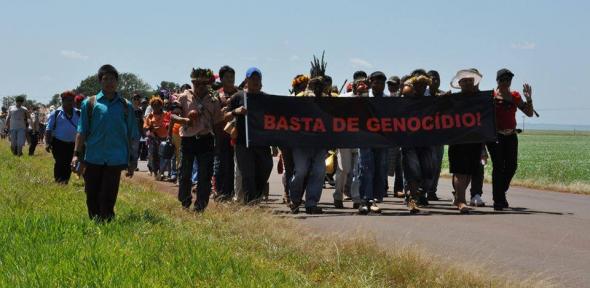
The Guarani-Kaiowá are an Indigenous people, who live in the Mato Grosso do Sul region of Brazil, where have long fought for their rights to territory. In the last three decades, their protests have gained visibility and strength in the region through the “Great Assembly” of Guarani-Kaiowá, the Aty Guasu.
From the 19th century, Indigenous labor was used in the extraction of the yerba mate (tea leaf) in the region. Indigenous people were not expelled from their traditional territory, and there were few conflicts between the Guarani-Kaiowá and non-indigenous people. Between 1915 and 1928 the Brazilian government created eight land reservations, the size of which took little account of the way the Guarani-Kaiowá way occupied and used their territory. During the 1950s to the 1980s, with the establishment of cattle ranches and soya-bean plantations, many Guarani-Kaiowá worked in the felling of the forest of the region that they inhabited. Soon after, the newly settled farmers, allied with local political powers and the dictatorship, began to violently displace Guarani-Kaiowá families from their traditional territories. As a reaction, the Aty Guasu emerged in the 1980s to challenge this systematic process of genocide.
Every year the Guarani-Kaiowá come together in the Aty Guasu, where they voice their demands and denouncements, and organize strategies of struggle. A recent strategy has been the reoccupation of lands that have already been officially identified as part of their territory, but that are still in possession of the farmers. This has generated three types of reaction from the farmers: First, they hired gunslingers, who evicted the Indigenous people from the reoccupied sites, often torturing and murdering them. Second, they obtained Federal Justice eviction orders, to be carried out by the police force. Third, they lobby strongly for legislative changes to undermine indigenous land rights. These reactions generate terror, suffering and death among the Guarani-Kaiowá.
According to the report Violência Contra os Povos Indigenas no Brazil (CIMI 2017), in 2016 alone there were 118 deaths among the indigenous population. Of those, 47% were in in Mato Grosso do Sul, where the Guarani-Kaiowá reside. For Guarani-Kiowa people, there is no life outside of their land. Their existence, cosmology and wellbeing are directly related to the land. Therefore, by mounting constant attacks on Indigenous land, the state is effectively promoting an anti-Indigenous and genocidal agenda.
